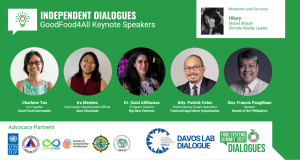Официальная обратная связь диалога для Саммита ООН по продовольственным системам 2021 года
Виды диалогов
Организатор
Язык диалога
Дата/время
Окончание
Город
Местоположение
Формат
Просьба ознакомиться с приводимыми ниже данными для получения регистрационной информации, если таковая имеется, или обратитесь к руководителю диалога, если желаете принять участие.
Куратор
Описание
Now more than ever, we need to accelerate the move towards more Conscious Consumption. COVID-19 and its adverse impacts have disrupted nearly all aspects of life for all groups in society. For young people, COVID has posed considerable risks to education, employment and mental health, and it is us and other future generations that will bear its long-term economic, environmental and social consequences. This is why the Global Shapers Community’s Davos Lab aims to inspire, equip and connect interested young people with the knowledge, networks and tools to help shape a more inclusive, sustainable and youth-driven post-COVID recovery plan.
2021 is the year the United Nations will convene a Food Systems Summit to launch bold new actions to achieve healthier, more sustainable and equitable food systems. Food systems touch every aspect of human existence. The health of our food systems profoundly affects the health of our bodies, as well as the health of our environment, our economies and our cultures. But too many of the world’s food systems are fragile and vulnerable to collapse, as millions of people around the globe have experienced first-hand during the COVID-19 crisis. When our food systems fail, the resulting disorder threatens our education, health and economy, as well as human rights, peace and security. As in so many cases, those who are already poor or marginalized are the most vulnerable.
The good news is that we know what we need to do to get back on track. Scientists agree that transforming our food systems is among the most powerful ways to change course and make progress towards all 17 Sustainable Development Goals. We all must all take action to transform the way the world produces, consumes and thinks about food. However, action to improve the sustainability of the goods and services market is inhibited by the continued debate on who should take responsibility:
- Should it be via purchases, and the power of the peso in our wallets in driving this movement forward?
- Should it be via investments, and their role as a critical enabler of corporate climate action?
- Should it be on corporations and demanding business transparency and decarbonization of supply chains?
- Should it be on or lobbying governments and institutions to ensure more sound policies and regulations are put in place?
- Should we turn to the global community with a mutual approach to ensure stakeholders come together in agreement to abide by certain enforced standards?
Creating a sustainable consumer environment is pressing. Reducing our consumption has never been more urgent. Incorporating habits and behaviours that nudge us to consume items with low carbon footprint is necessary. Collectively, all consumers, especially the young people have the potential to accelerate the transition to a more sustainable, circular economy.
Благодарности


